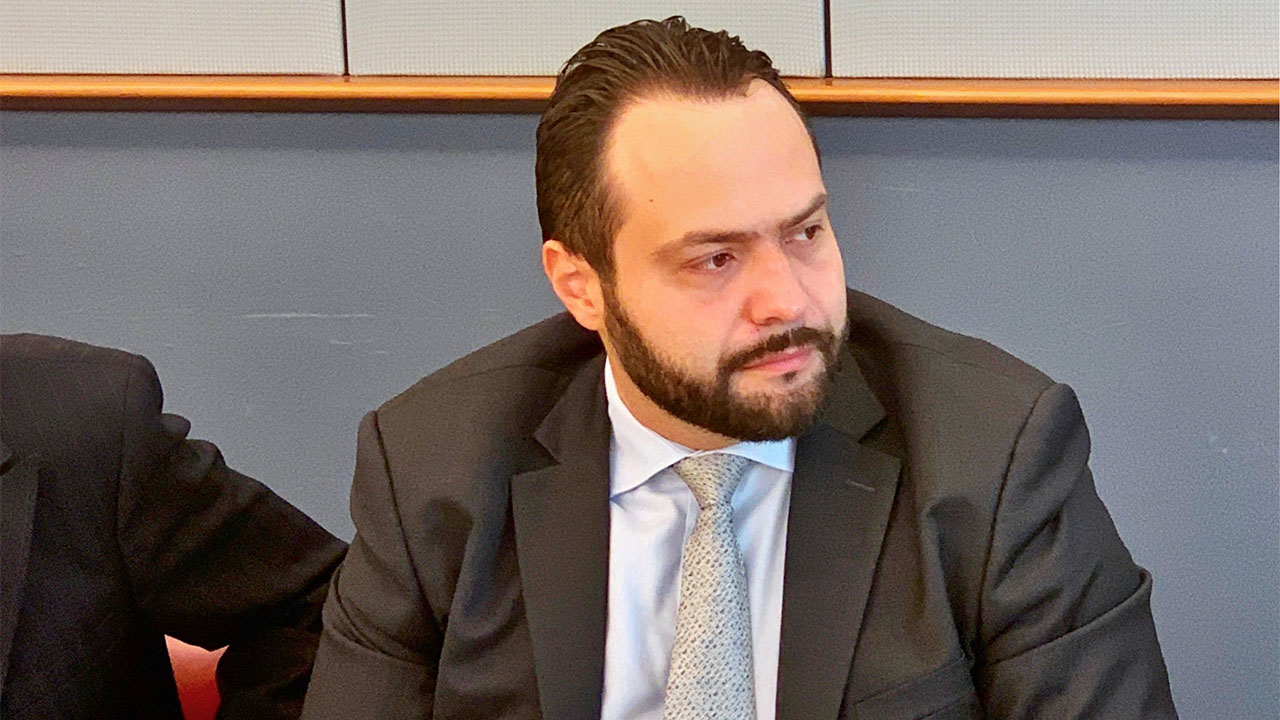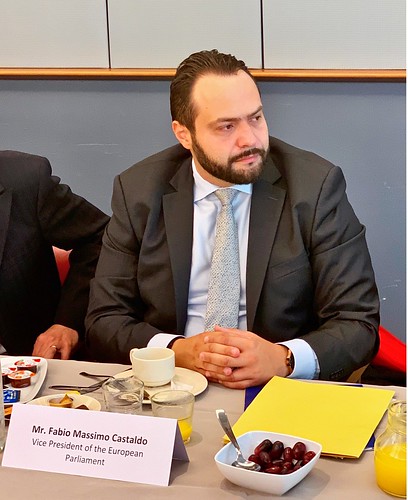
On Wednesday, 2 October 2019, Members of the European Parliament (MEPs) and their representatives gathered with members of civil society organizations to discuss the essential role of the European Union (EU) in the fight against impunity – a fight that today includes new facets, new faces, and new fronts, but which is more urgent than ever. Hosted by the Parliamentarians for Global Action (PGA) Group at the European Parliament (EP) in Brussels, Ms. Julie Ward, MEP (UK, PGA member), convened the discussion by noting the investment the European Union has made to support the fight against impunity and the Rome Statute of the International Criminal Court (ICC) system, noting that Court has faced impediments and that support is more vital than ever before.
Mr. Fabio Massimo Castaldo, MEP (Italy, PGA Member), in his role as Vice-President with portfolio responsibility on human rights and democracy, pressed the group to consider two essential questions:
-
“How can we [as members of the European Parliament] protect basic human rights if impunity for shocking atrocity crimes like genocide, war crimes, and crimes against humanity is still accepted? and
-
How can we ensure that all peoples and communities of the world live in peace and prosperity, if there is impunity for the launching and execution of aggressive wars?”
Mr. Castaldo underscored that EU support for the Rome Statute is embedded in a legally binding source of EU law[1]. Hence, there is not only an opportunity for the EU to do its part to make the Rome Statute system work; it is a legal obligation. Mr. Castaldo recalled instances where the EU has failed to meet that obligation, including a lack of strong EU support for Yemen’s ratification of the Rome Statute, which could have provided an avenue for justice for victims of the atrocities that are ongoing.
We are required to do more, and better [in the fight against impunity]. And if we would have done more, and better, we could have probably prevented, or at least mitigated, some of the dramatic situations of impunity that we are confronting today.Mr. Fabio Massimo Castaldo
Vice-President, European Parliament (Italy)
Picking up the theme of caution against inertia, Ms. Lotte Leicht, EU Director of Human Rights Watch, acknowledged the “numbness” that can ensue in the face of the sheer volume and scale of mass atrocities and reminded discussants that behind every single one of the numbers is a human being with a story. She shared one such story of an individual on whose behalf Human Rights Watch has advocated – Mansour Omari, a Syrian journalist unlawfully detained and tortured for over a year, one among the tens of thousands of activists, journalists, humanitarian workers, doctors, and lawyers forcibly disappeared or unlawfully incarcerated under the regime of Bashar Assad. When Mr. Omari was finally released, he smuggled out the names of all 82 inmates with whom he shared a cell, written in blood and rust, so that they would not be forgotten[2]. Ms. Leicht urged the MEPs present to likewise use their voices and the full prerogatives of their office to ensure that victims like Mr. Omari are not forgotten and that they receive justice.
This is a time when the voice of parliamentarians is indispensable – both in this house and in your national parliaments.Ms. Lotte Leicht
EU Director, Human Rights Watch
It is not only “empathy fatigue” that frustrates action. The fight against impunity has a different face than 30 years ago – or with increasing frequency, no face at all, as when unmanned drones can target civilian populations in flagrant flouting of international humanitarian law or anonymous “bots” and “trolls” can assail corporations and take down governments. Mr. Urmas Paet, MEP (Estonia, PGA member) and EP Rapporteur for Cyber Defense, noted that atrocity crimes have taken on new dimensions. To the three spheres of traditional combat – land, sea, and air – a fourth has been added: cyber. New methods of committing atrocity crimes can help perpetrators to evade justice. Concurring, Ms. Nathalie Loiseau, MEP (France), Chair of the Subcommittee on Security and Defense, asserted that it is time for the EU to play a leading role to advance international regulation and controls on autonomous weapons systems (including drones) under International Humanitarian Law (IHL). Ms. Loiseau concurred with PGA Secretary-General Dr. David Donat Cattin that the Rome Statute of the ICC and other legal standards of IHL are very important and useful for the armed forces, who, like parliamentarians, must work to promote respect for such standards.
In this evolving context, the European Union has an indispensable role to play, as a global actor and the world’s biggest development-cooperation donor, founded on the principles of liberty, democracy, respect for human rights and fundamental freedoms under the Rule of Law. As Mr. Castaldo affirmed, “Where a culture of impunity is allowed to take root, violence is always rewarded and the institutions and Rule of Law are undermined. [We must] cooperate to usher in a new era of accountability.” To realize this pledge, participants in the discussion contributed to the development of 10 Action Points to Strengthen the Role of the European Union in Fighting Impunity:
-
Support the full implementation of the EU Decision on the ICC and the calls for action on the fight against impunity contained in several resolutions of the European Parliament, which historically has been a driving and innovative force in the fight against impunity for the worst human rights abuses and the gravest abuses of power: In this respect, the upcoming 2019 Resolution on Human Rights in the World must build on previous resolutions, include strong EU support for the fight against impunity and address the new challenges for international and domestic justice.
-
Redouble the leading role of the EU in promoting the universality of the Rome Statute of the International Criminal Court, as emphasized in multiple resolutions[3], by calling for States that have not yet ratified the Statute and its amendments to do so posthaste, assuring those wavering in their commitment, and providing support for the Court in the face of criticism and backlash[4].
-
Reinforce and reiterate the European Union’s message on the ICC with a clear, strong, and unified voice, ensure that the Court has the support it requires to effectively fulfill its mandate, and demand that the EU Council and Member States do more in operationalizing this strong call for action.
-
Renew the demand for EU institutions to include the Rome Statute in the list of conventions required for a Third State to obtain GSP+ trade-status with the EU, the most privileged trade relationship accorded by the EU for States that agree to respect human rights and justice standards.
-
Insist that the new High Representative for Foreign and Security Policy is unwavering and dogged in spearheading Europe’s pursuit of accountability for international crimes and providing the EU Special Representative for Human Rights with the full support and resources necessary to discharge the responsibilities of his office effectively, which since 2018 – the 20th anniversary of the Rome Statute – has included a reinforced focus on international justice and IHL.
-
Demand reform and improvement in the functioning of domestic jurisdictions to combat impunity, including considering judicial and legislative innovations emanating from both within and beyond the European Union[5].
-
Provide support, experience, and expertise to other States Parties to the Rome Statute beyond the EU to implement the Statute and enhance their domestic legislative frameworks to hold perpetrators of atrocity crimes accountable.
-
Participate actively in efforts to enhance the Court’s functioning, including supporting the efforts of States Parties to improve the transparency and accountability in the merit-based processes for the nomination and election of the ICC judges and Prosecutor in 2020.
-
Ensure that EU budgetary support for the fight against impunity is fully implemented, in line with the regulation establishing the European Instrument for Democracy and Human Rights (EIDHR) 2014-20, the only budgetary tool in the largest international development-budget in the world that does not require the consent or acquiescence of the territorial State in which civil society activities are financed, therefore allowing for intervention in human rights crises in recalcitrant States; and remain extremely vigilant that future practice of the Commission upholds the imperative to safeguard the object and purpose of the EIDHR in the broader framework of the external development budget in which the EIDHR will be merged in 2021-2027. In this respect, the European Parliament shall remain extremely cognizant of the political considerations and motivations of Third States that could interfere with the EU’s efforts to advance the fight against impunity through projects supporting legislation, legal processes, advocacy, or any strategic action aimed at bringing to justice the alleged perpetrators of international crimes.
-
Lead by example within the EU by complying with all international law obligations that member states freely decided to adopt and accept.
The PGA group in the European Parliament, in coordination with civil society organizations forming part of the Coalition for the International Criminal Court (CICC), will continue to support all the Members of the European Parliament in actuating this plan.
Footnotes:
- Council Decision 2011/168/CFSP of 21 March 2011 on the International Criminal Court (repealing and replacing Common Position 2003/444/CFSP)
- The pieces of fabric are now part of a new exhibit at the U.S. Holocaust Memorial Museum in Washington, D.C.
- Including the resolution on Human Rights in the World, adopted 12 December 2018 (texts adopted, P8_TA(2018)0515.)
- See id. at para. 31.
- Potentially including, inter alia, creative approaches for application of universal jurisdiction being explored in Sweden and Canada, or interpretation of atrocity crimes to allow jurisdiction, such as the recent ICC Pre-Trial Chamber decision on jurisdiction over the crime of deportation.




